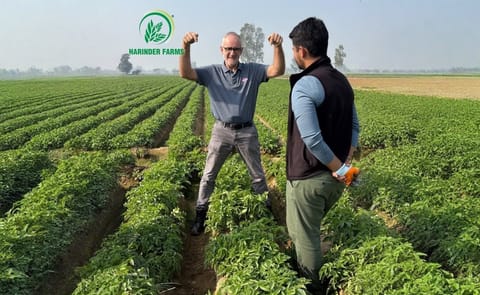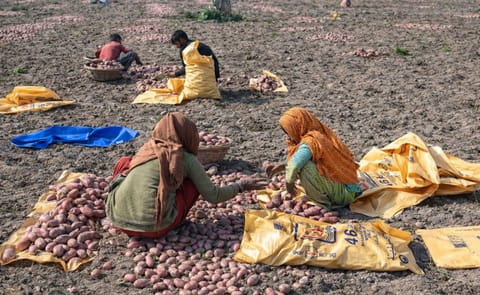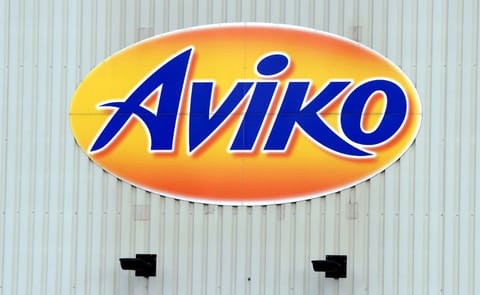Romain Cools: 2020 could well become the toughest NW European potato season in 50 years
2020 could become the toughest NW European potato season in 50 years

Last week, the North-western European Potato Growers (NEPG) association announced their harvest estimate for the 2020/2021 season.
They reckon potato yields will be between 27 and 27,3 million tons. That's for the five most important potato-growing countries in North-western Europe.
Romain Cools, General Secretary at Belgapom:
“These results correspond with the information we got from various parties.”
“According to some, this could become a disastrous year. But, the yields are actually surprisingly higher than many estimated.”
“There are, however, vast differences between plots, varieties, and regions. Belgium isn't faring so well thanks to the lower rainfall in the country. Belgium has the lowest irrigation capacity too. It's no coincidence that we're in constant discussions now. These are with the various sectors and links in the chain and the government.”
“We must draw up a new water policy for our agriculture and horticulture. If we consider the figures, we see we're just above the last five-year average. These were bad years. Looking at the last ten years' numbers, potato produce scores less well.”
Protectionism
The market, on the other hand, isn't as favorable as the yields, says Cools.
Romain Cools:
“Protectionism is rearing its head is some countries. Trump, Putin, and the Chinese are stoking these fires. Free market trade is no longer a given. That's partly due to the pressure from COVID-19. Europe is a clear exception. But, I think we're standing just about alone at the moment. Protectionism isn't the only issue.”
“We've determined that the local market sales aren't yet at pre-corona crisis levels. Certainly not to the hospitality, food service, and industrial kitchen sectors.”
“There, we're still way off the pre-COVID-19 situation. Sales to retailers are, however, going well. But, these don't compensate for the drop in exports and sales to hospitality and catering businesses.”
Brexit
Romain Cools:
“There are also constant coronavirus waves. Look at Brazil - an important country when it comes to our sales. The cherry on the cake is the UK leaving the EU at the end of the year. But, no-one knows what will happen there. We must realize that British potato processing is in the hands of Canadian and American companies.”
“If they manage to turn the market, it'll be catastrophic for the Benelux region. The UK is, after all, the second most important export market for Belgium and the Netherlands. Unfortunately, I must admit that the short term future isn't rosy when it comes to sales. If we were to have had a super yield this year, I think the past, terrible season would've been repeated.”
CIPC
Romain Cools:
“While we're mentioning challenges - I think exports to third-party countries are going to become very difficult. That's due to the European ban on CIPC. We'll have to wait to see how the entire European potato sector will deal with the alternatives to conserving the current crop. Growers hope to store potatoes until May/June, using natural substances. But, some companies have done studies than officially negate these results. So, I expect problems in the course of the season.”
“And then I haven't even taken the European Commission's 'Farm to Fork' strategy into consideration. This is part of the 'Green Deal'. No-one can deny we're facing a massive climatic challenge. And recently, the Commission chairperson, Ursula Von der Leyen, announced that Europe would support this Green Deal wholeheartedly. Potato cultivation, trade, and processing will change radically in the coming years too. Considering all these challenges - plus the COVID-19 woes - I think this could be the toughest season in 50 years.”
“We mustn't forget the new (temporary) maximum residue levels (tMRL) either. These will be applied from 2021/2022. I don't know if all the farmers who store potatoes are aware of this. They must deep-clean their warehouses to remain below this temporary standard. If they don't do this, they might have readings above the tMRL. The government will then demand all the stored potatoes be destroyed, at the grower's cost.”
“That's not only a huge loss for the farmer. It will also cost them money to destroy and remove these potatoes. Some may not believe me. But, Belgapom is going to take samples at 1,000 warehouses in the coming months.”
“We want to see if the stored potatoes are already below this tMRL. We need this data to convince the EC that we need this measure. Secondly, it's a tool to show the growers whether they're ready.”
Fresh market
Despite all these difficulties, there are positive developments in the potato sector as well.
Romain Cools:
“The fresh market is certainly doing better. Sadly, the fresh market only forms a limited part of our potato sector as a whole. Hopefully, we can maintain this trend. But, the current autumn weather isn't helping to increase potato consumption. We usually see potato consumption climb in September.”
“Above all, however, I'm rooting for the processing industry. That market on both the domestic and global levels has definitely not recovered yet. To top it off, they're being confronted by rising protectionism in some countries. There are other major changes, like the replacement of CIPC. This is something producers in the rest of the world don't need to deal with (yet).”
“Unfortunately, these are hard times for this great product. Many people in Belgium, the Netherlands, France, and Germany rely on the potato industry. So, it's crucial that people, including politicians, take this industry seriously. Our suppliers, growers, traders, and processors hope the government will support them through this tough time. Support on an international competitive, as well as free trade, level is especially important. This must ease the transition from a time of CIPC use to one without it.”










